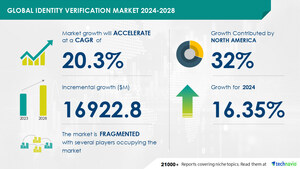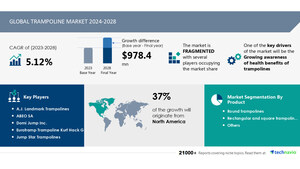NEW YORK, Dec. 15, 2024 /PRNewswire/ -- The global building automation and control systems market size is estimated to grow by USD 31.12 billion from 2024 to 2028, according to Technavio. The market is estimated to grow at a CAGR of 8.71% during the forecast period.
For comprehensive forecast and historic data on regions,market segments, customer landscape, and companies- Click for the snapshot of this report
Report Attribute |
Details |
Base Year |
2023 |
Forecast period |
2024-2028 |
Historic Data for |
2018 - 2022 |
Segments Covered |
End-user (Commercial buildings, Residential buildings, Government buildings, and Other buildings), Type (Integration and Services), and Geography (Europe, North America, APAC, Middle East and Africa, and South America) |
Regions Covered |
Europe, North America, APAC, Middle East and Africa, and South America |
Region Outlook
- North America
- Europe
- Asia
- Rest of World
1. Europe - North America is estimated to contribute 30%. To the growth of the global market. The Building Automation And Control Systems Market report forecasts market growth by revenue at global, regional & country levels from 2017 to 2027. The Building Automation and Control Systems Market encompasses sensors, detectors, relays, and smart electronics that optimize energy consumption and operating costs in various structures such as office buildings, shopping centers, public transportation hubs, airports, and train stations. Core competencies include HVAC Control, Lighting Control, and Security Access Control. The industry verticals of Residential and Hospitality sectors also benefit from these systems, contributing to energy efficiency and interconnected systems in urbanization. Material types, including semiconductor chips, are essential components in the construction sector, enabling remote monitoring, energy management systems, and smart appliances. The Technology growth is driven by international energy agencies' focus on energy efficiency and the integration of real estate assets. Urbanization and the need for smart buildings have accelerated the demand for these systems, with interconnected systems and international energy management systems playing a significant role in reducing energy consumption and monitoring in various applications.
The Building Automation and Control Systems market continues to grow due to increasing demand for energy efficiency and cost savings in commercial and industrial buildings. These systems enable automatic control of HVAC, lighting, and security, improving comfort and reducing energy consumption. Market leaders include Honeywell, Siemens, and Johnson Controls, offering innovative solutions to meet evolving customer needs. The market is expected to expand further with the integration of IoT and AI technologies.
For more insights on Europe's significant contribution along with the market share of rest of the regions and countries - Download a FREE Sample
Segmentation Overview
- End-user
- 1.1 Commercial buildings
- 1.2 Residential buildings
- 1.3 Government buildings
- 1.4 Other buildings
- Type
- 2.1 Integration
- 2.2 Services
- Geography
- 3.1 Europe
- 3.2 North America
- 3.3 APAC
- 3.4 Middle East and Africa
- 3.5 South America
Get a glance at the market contribution of rest of the segments - Download a FREE Sample Report in minutes!
Research Analysis
The Building Automation and Control Systems (BACS) market is experiencing significant growth due to the increasing focus on energy efficiency and sustainability in both commercial and residential buildings. With the rising energy consumption and operating costs, integrated systems that manage HVAC, lighting, safety, and security are becoming essential for real estate assets. The market is driven by the adoption of electronic devices and software, as well as the integration of hardware components such as sensors and actuators. Technology advancements, including 5G technology and energy-efficient buildings, are key factors fueling market growth. Core competencies of BACS include HVAC Control, Lighting Control, and Security Access Control. Material types and industry verticals, such as residential and hospitality, are also important considerations. Safety systems, air conditioning, and lighting are critical components of BACS, with energy efficiency and building sustainability being key priorities. De-carbonization is also a significant trend, as the industry seeks to reduce greenhouse gas emissions and promote a more sustainable future. Overall, the BACS market is poised for continued growth as the demand for energy-efficient and intelligent building solutions increases.
Market Overview
Building Automation and Control Systems (BACS) market is witnessing significant growth due to the increasing focus on energy consumption and operating costs reduction in various industry verticals. Technology growth in integrated systems, real estate assets, and urbanization is driving the demand for energy efficiency and interconnected systems. The International Energy Agency reports that energy consumption in buildings accounts for nearly 40% of global energy usage. Semiconductor chips and smart appliances are integral components of BACS, enabling remote monitoring and energy management systems. The construction sector is adopting BACS for safety systems, HVAC systems, and lighting control in energy-efficient buildings. The commercial and industrial segments are investing in BACS for facility management, access management, and condition-based maintenance of electrical appliances. The green building concept and carbon-neutral goals are further boosting the market growth. However, cyberattacks and malware attacks pose a significant threat to the operations of BACS. The manufacturing companies are focusing on real-time monitoring, 5G technology, and supply chain disruptions to mitigate risks and seize business opportunities. The market offers significant potential for growth in various construction activities, including office buildings, shopping centers, public transportation hubs, airports, and train stations. The core competencies of BACS include HVAC Control, Lighting Control, and Security Access Control. The material type and industry vertical, such as Residential, Hospitality, and others, also influence the market dynamics. Safety, comfort, and security are the primary concerns for building automation and control systems in various industry verticals.
Start exploring market insights by Download a FREE Sample Report in minutes!
Key Topics Covered:
1 Executive Summary
2 Market Landscape
3 Market Sizing
4 Historic Market Size
5 Five Forces Analysis
6 Market Segmentation
7 Customer Landscape
8 Geographic Landscape
9 Drivers, Challenges, and Trends
10 Venodr Landscape
11 Vendor Analysis
12 Appendix
About Technavio
Technavio is a leading global technology research and advisory company. Their research and analysis focuses on emerging market trends and provides actionable insights to help businesses identify market opportunities and develop effective strategies to optimize their market positions.
With over 500 specialized analysts, Technavio's report library consists of more than 17,000 reports and counting, covering 800 technologies, spanning across 50 countries. Their client base consists of enterprises of all sizes, including more than 100 Fortune 500 companies. This growing client base relies on Technavio's comprehensive coverage, extensive research, and actionable market insights to identify opportunities in existing and potential markets and assess their competitive positions within changing market scenarios.
Contacts
Technavio Research
Jesse Maida
Media & Marketing Executive
US: +1 844 364 1100
UK: +44 203 893 3200
Email: [email protected]
Website: www.technavio.com/
SOURCE Technavio

WANT YOUR COMPANY'S NEWS FEATURED ON PRNEWSWIRE.COM?
Newsrooms &
Influencers
Digital Media
Outlets
Journalists
Opted In




Share this article